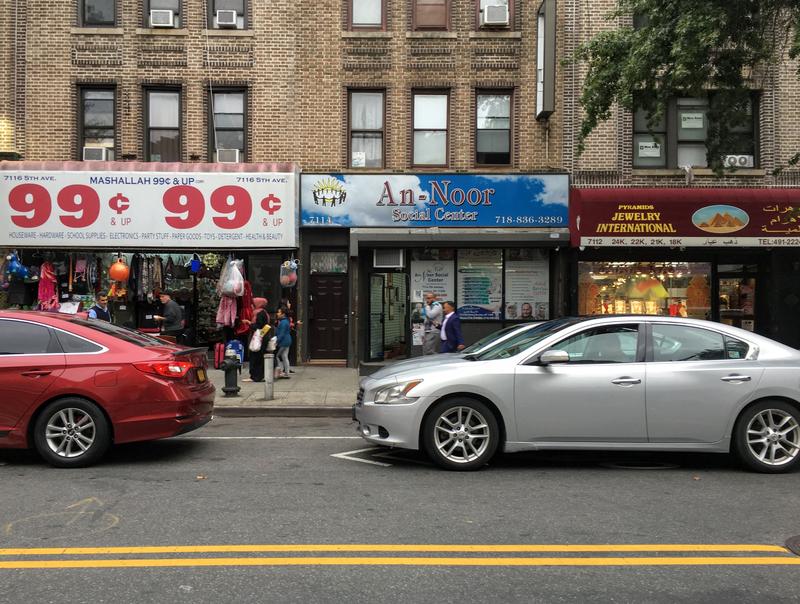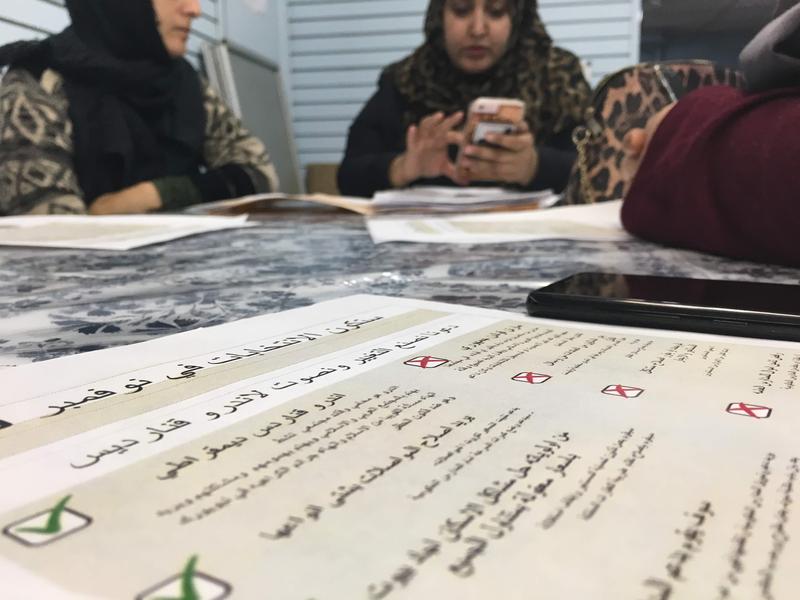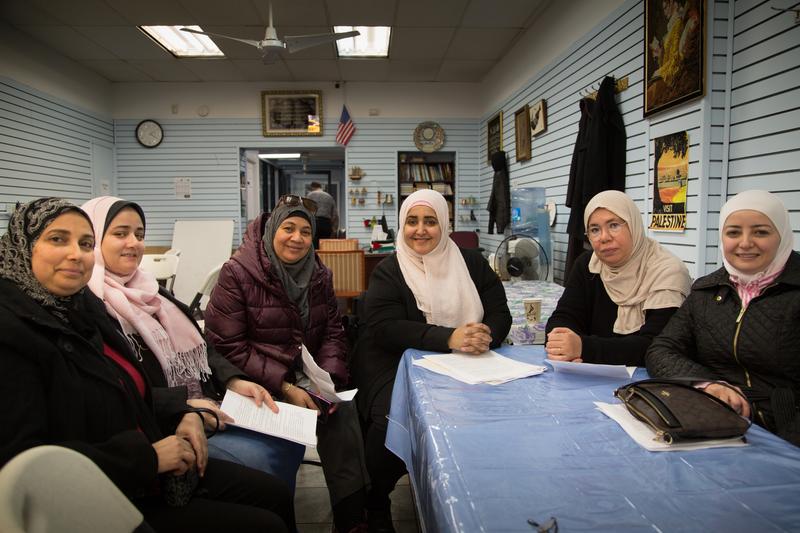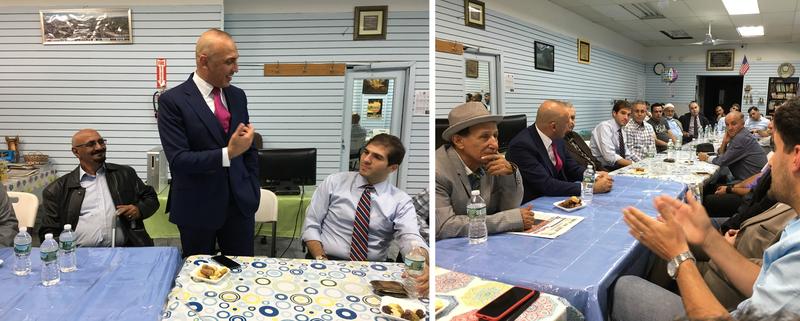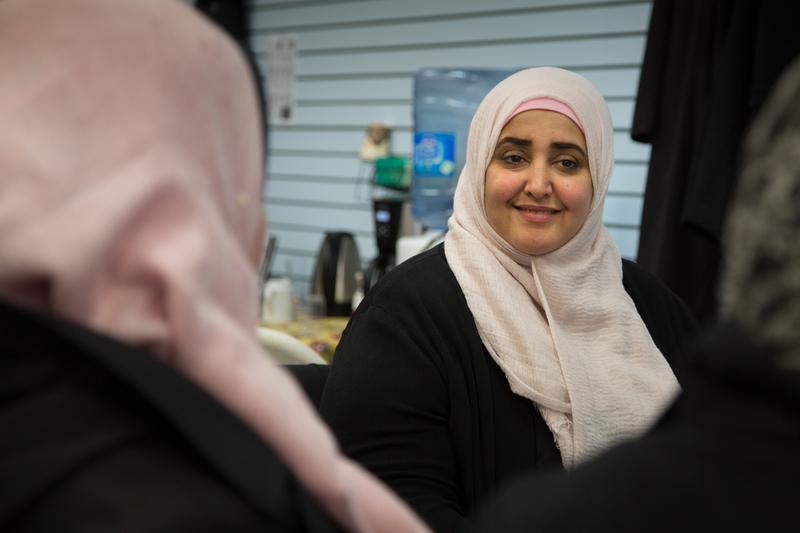
There’s an invisible line that runs east to west, through Fifth Avenue, in Bay Ridge, Brooklyn. On one side, below 75th street, you’ll find Turkish baklava and sweet, milky Yemeni tea. On the other side, above 75th Street, it's more Irish pubs and diners.
These two parts of Bay Ridge—the growing immigrant community and the longstanding, traditionally conservative white community—have coexisted for a long time. The Arab and Muslim population is tricky to quantify but there is little doubt that it's growing.
Arab Americans are supposed to define themselves as white on the census, so parsing race data doesn’t deliver the most nuanced picture. A 1982 New York Times article described it as “the last white enclave in Brooklyn,” citing the 1980 census which found 95 percent of the population was white. That included descendants of the early Dutch settlers, as well as Norwegian, Italian, and Irish people, but also a relatively recent influx of Lebanese immigrants. Syrians have long lived in the neighborhood, especially after the residents of Little Syria in Manhattan were displaced by the construction of the Brooklyn-Battery Tunnel. And in more recent years, Egyptian, Yemeni, Jordanian, and Palestinian immigrants have settled in the neighborhood in higher numbers.
Last year, for the first time ever, Arab voters in South Brooklyn had the opportunity to elect someone from their community to represent them on the New York City Council. The candidate: Reverend Khader El-Yateem, affectionately known as “Father K.” He’s a Palestinian-American, Lutheran pastor. He lost the Democratic primary to Justin Brannan, who later won the seat.
“A lot of folks during Father K's campaign who went out to vote, it was the first time they ever voted ever, in their LIVES. Not just in the United States but in their lives,” said Rama Issa, the executive director of the Arab American Association in Bay Ridge. “Nobody was counting on those people to come out and vote.”
This patch of South Brooklyn has long been considered a uniquely Republican stronghold, by New York City’s standards, but the newly-kicked-up energy from Father K’s run last year and Donald Trump’s election the year before may change that, at least in terms of who represents the area in the state senate. Senate District 22 stretches from Bay Ridge through Bensonhurst, hugs Ocean Parkway, then curls its way to Marine Park. It’s been represented by Republican incumbent Marty Golden for 16 years. He’s being challenged (for a second time) by Democrat Andrew Gounardes, who works as counsel to Brooklyn Borough President Eric Adams.
Organizers from Father K’s campaign got behind the effort to unseat Golden. They formed a political group called Yalla Brooklyn; it’s the brainchild and parting gift of Father K, who recently left New York to work for the church in Florida. The name translates to: “Come on, let’s go Brooklyn!”
Organizers with Yalla Brooklyn are counting on Arab-Americans to recognize the shift in political winds by voting for Democrats—like Gounardes—down the ballot.
“Historically—culturally too—the Arab and Muslim community is a very conservative community,” explained Issa, who’s also on the board of Yalla Brooklyn. “But I also think, with the election of Donald Trump, that there have been a lot of different things the Republican Party has done to show that they don't really care about our community.”
On one recent Sunday evening, Somia Elrowmeim, co-vice president of Yalla Brooklyn, went door-to-door to drive this message home, referring to her list of addresses of Arabic-speakers. Between houses, she said she saw the impact of Trump’s presidency when she knocked on doors. Some people told her they wanted to switch their party affiliation to Democrat. She even saw it in her own family, some of whom voted for Trump.
“They thought that he's going to stop the war in Yemen and he's going to stand up against Saudi Arabia,” said Elrowmeim. “But after they saw what happened after he won and how he's standing against Arabs, how he started the Muslim ban, many of them change and now they are Democratic.”
It’s not just about Trump, or Republicans versus Democrats. It’s also very much about Marty Golden. Within the Arab community in south Brooklyn, specifically, Golden has developed a reputation of being a photo-op politician.
“He has good relationships with many members of the community but he’s just basically serving people with empty words, no meanings, no actions,” said Mohammad Al-Sawaer, an attorney and active community member.
Al-Sawaer organized a recent sit-down with Gounardes for representatives from different community centers and cultural associations in Bay Ridge. Gounardes listened as the group ran through a list of concerns: about landlords who raised the rent every few months; about Islamophobia and bias. Gounardes told them his staff hired an Arabic-speaker to act as a liaison to the community, to which the people nodded approvingly. (WNYC asked Golden's office if he had a similar liaison but has not received a response yet.)
At several points, it was clear their support was not so much about Gounardes as it was in opposition to Golden. The meeting ended with Al-Sawaer saying to Gounardes: “We wish you the best. You are our candidate. Everybody here loves you and hates Marty Golden!”
The Arab community here has never forgotten that Marty Golden once signed a letter praising the NYPD’s surveillance program of the Muslim community after the Sept. 11 attacks. They haven't forgotten that Golden wrongly stated on WNYC that one of the 9/11 hijackers was from Bay Ridge. (His staff says he got that mixed up with the Egyptian man convicted in the 1993 World Trade Center bombing.)
And they absolutely never forgot the time that Golden told a reporter that Arab-Americans in his district don’t vote. A constituent confronted Golden about those words at a recent debate between the candidates.
“Did you say that? Why did you say that?” the woman asked.
“I did not say that," Golden responded. "What I did say, and, as my parents came from Ireland, they had eight kids when they got here. They worked very very hard, but they did not go out and register to vote. When immigrants come to this country, it takes a period of time for them to be accustomed to going in, registering to vote, and voting.”
Attorney Al-Sawaer later said maybe that was true of his community before, but not anymore.
“Arabs and Muslims came in big numbers in support of Father K, proving they are a factor in the election and they participate heavily in that election," he said. "Therefore, you now find [city council] members who come to us and seek our support and they look into our issues.”
Others said they take Golden’s words as a challenge.
“He doesn't think our folks come out and vote,” said Issa of Yalla Brooklyn, with a laugh. “Bring it on then!”

